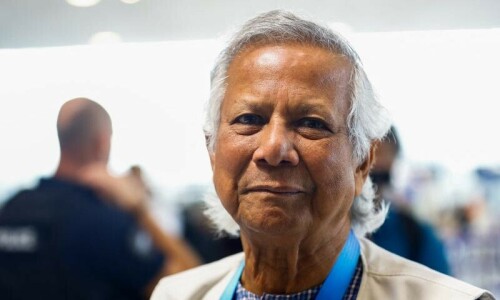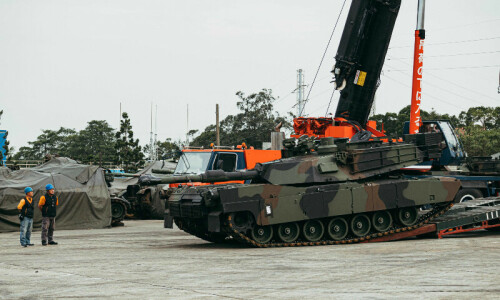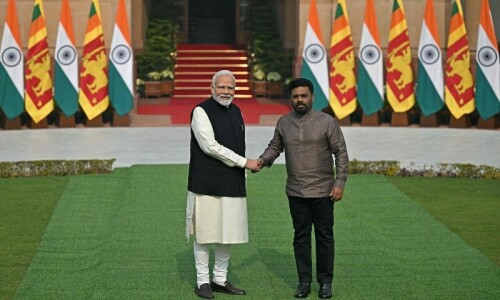BEIJING: North Korea's ally China Thursday threw its diplomatic weight behind Pyongyang's call for unconditional talks with the South, while Washington and Seoul remained more circumspect about the offer.
Beijing's words of support came as the US special envoy on North Korea, Stephen Bosworth, pursued a three-nation tour across the region to sound out officials in Seoul, Beijing and Tokyo on how to proceed with Pyongyang.
North Korea offered “unconditional” negotiations with the South Wednesday, in its most conciliatory remarks since the nuclear-armed state sent tensions on the peninsula soaring in November by shelling a South Korean island.
Chinese foreign ministry spokesman Hong Lei said Beijing -- Pyongyang's main ally and its economic lifeline -- backed the North's initiative.
“We support and welcome relevant parties to have contact and dialogue, and make active interactions to jointly steer the situation in a desirable direction,” Hong told reporters.
“China always believes that dialogue and consultation are the only effective approach to solving peninsula-related issues. China will continue to play a constructive role to this end.”In an unusually cordial statement, carried by the state KCNA news agency, North Korea said it “courteously proposes having wide-ranging dialogue and negotiations”.
Pyongyang is “ready to meet anyone, anytime, anywhere”, it said, calling for “unconditional and early opening of talks” with officials with “real power and responsibility”.
South Korea dismissed the approach.
“We don't consider it as a serious offer for dialogue,” unification ministry spokeswoman Lee Jong-Joo told AFP.
She noted the North had regularly issued similar statements until 2007 as part of what she said was a long-standing strategy of driving a wedge between the South Korean government and its people.
The North should instead show it was serious about its obligations under a 2005 agreement on denuclearisation and apologise for the November shelling and for the sinking of a South Korean warship in March, she said.
Washington echoed Seoul's response, saying the North had to take “useful steps” to show that its proposal was serious.
“It needs to demonstrate it is sincere in the offer,” State Department spokesman Philip Crowley told reporters, noting US Secretary of State Hillary Clinton discussed the issue with visiting Chinese Foreign Minister Yang Jiechi.
In Beijing, Bosworth held what the US embassy described as “useful” talks with his Chinese counterpart Wu Dawei and Vice Foreign Minister Zhang Zhijun, after a visit to Seoul.
During those talks, according to South Korean foreign ministry officials, Bosworth stressed that Pyongyang needed to show it was sincere about mending ties with Seoul if six-party talks on its nuclear programme were to resume.
Beijing is the host of those negotiations, which bring together the two Koreas, China, Japan, Russia and the United States.
When asked about Bosworth's visit, Hong said the two sides had “agreed to continue to be committed to safeguarding peace and stability on the peninsula and promoting the six-party talks”.
Bosworth was due in Tokyo on Thursday.
The North has previously refused to discuss the nuclear issue directly with the South, saying it wants to deal only with Washington, but its latest statement suggested it may be willing to engage with Seoul on the topic.
The North's proposal put the South in a dilemma, analysts said.
“This dialogue offer places the South in a very awkward position, especially when both China and the United States want to see tension reduction through dialogue,” said Hong Hyun-Ik, of the private Sejong Institute.
“The North is shifting the blame for the lack of dialogue to the South.”The North quit the six-nation talks in April 2009 and staged a nuclear test a month later, its second since 2006, in protest at continuing “hostile” US policy toward the communist state.
Relations between the two Koreas were stretched to breaking point after the North's shelling in November, which killed four people including two civilians.
Tensions have softened since the New Year, with South Korean President Lee Myung-Bak offering closer economic ties if Pyongyang changes course. – AFP














































Dear visitor, the comments section is undergoing an overhaul and will return soon.